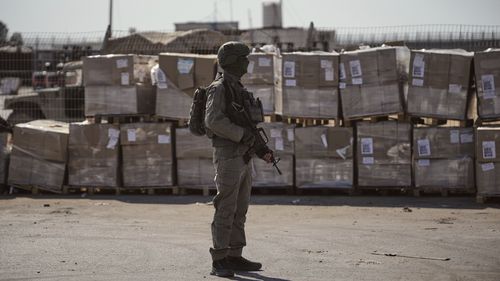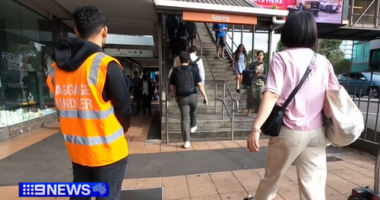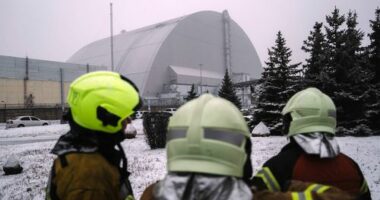Share this @internewscast.com
Reports from the United Nations and various experts indicate that Palestinians in Gaza are facing the threat of famine, with an increasing number of deaths linked to malnutrition.
Yet Israel says hundreds of truckloads of aid are waiting at the border for the UN to distribute in Gaza.
Recently, on Thursday, Israel’s military organized a visit for journalists to the Gaza side of the Kerem Shalom crossing. Here, journalists observed hundreds of pallets filled with aid boxes in a large area.

According to Israel, since easing a complete blockade in May, around 4,500 aid trucks have been permitted entry. This equates to roughly 70 truckloads per day, which is one of the lowest rates recorded during the conflict and significantly below the several hundred daily deliveries that the UN deems necessary.
Israel says it lets in enough aid and faults UN agencies for not doing enough to retrieve and get it to those in need.
The UN says it is hampered by Israeli military restrictions on its movements and incidents of criminal looting.
Here’s a look at why the aid can’t be delivered.
Unsafe routes, bureaucracy and access denials
To retrieve the aid at the border â or move around most of the Gaza Strip â UN trucks must enter zones controlled by the military after obtaining its permission.
Once the aid is loaded, the trucks must get safely to the population. The whole trip can take 20 hours, the UN says.
Large crowds of desperate people, as well as criminal gangs, overwhelm trucks as they enter and strip off the supplies.

Witnesses say Israeli troops regularly open fire on the crowds, causing deaths and injuries.
“Taken together, these factors have put people and humanitarian staff at grave risk and forced aid agencies on many occasions to pause the collection of cargo from crossings controlled by the Israeli authorities,” said Olga Cherevko, a spokesperson for the UN Office for the Coordination of Humanitarian Affairs, or OCHA.
At least 79 Palestinians were killed while trying to get aid entering Gaza this week, according to Gaza’s health ministry.
A UN official who was not authorized to discuss the issue publicly and spoke on condition of anonymity, said Israeli forces opened fire toward crowds who tried to take food from an entering truck convoy.
Israel’s military said soldiers shot at a gathering of thousands of Palestinians in northern Gaza who posed a threat, and it was aware of some casualties.

On its website, OCHA said there is a breakdown of law and order, which is partly due to the collapse of Gaza’s Hamas-run civilian police force, leading to insecurity at the crossings and for convoys moving within Gaza.
It said this is further compounded by the increase of armed gangs.
The military frequently assigns routes for trucks to use that are “unsuitable, either impassable for long truck convoys, passing through crowded markets, or controlled by dangerous gangs,” OCHA said. When the UN objects to a route, the military provides few alternatives, it said.
The UN also struggles with facilitation from the military. It says more than half its movement requests, 506 out of 894, were either denied or impeded by the military in May, June and July.
There are also regular delays by Israel’s forces in coordination. The delays result in lost time, difficulty planning and wasted resources as convoys spend hours waiting for the “green light to move only to be denied,” OCHA said.
Israel says it imposes no limit on aid trucks entering Gaza
Israel says it doesn’t limit the truckloads of aid coming into Gaza and that assessments of roads in Gaza are conducted weekly where it looks for the best ways to provide access for the international community.
Col. Abdullah Halaby, a top official in COGAT, the Israeli military agency in charge of transferring aid to the territory, said there are several crossings open.

“We encourage our friends and our colleagues from the international community to do the collection, and to distribute the humanitarian aid to the people of Gaza,” he said.
An Israeli security official who was not allowed to be named in line with military procedures told reporters this week that the UN wanted to use roads that were not approved.
He said the army offered to escort the aid groups but they refused.
UN says letting enough aid in daily will solve the problem
For much of the war, UN agencies were able to safely deliver aid to those who need it, despite Israeli restrictions and occasional attacks and looting.
The Hamas-run police provided public security. But as Israeli airstrikes targeted the police force, it has been unable to operate.
The UN says being escorted by Israel’s army could bring harm to civilians, citing shootings and killings by Israeli troops surrounding aid operations.

The UN and aid groups also say that looting of trucks lessens or stops entirely when enough aid is allowed into Gaza.
“The best protection for us is community buy-in,” said UN spokesperson Stephane Dujarric.
“And to get that community buy-in, communities have to understand that trucks will come every day, that food will come every day.”
“That’s what we’re asking for,” he said.













